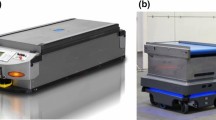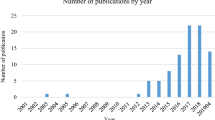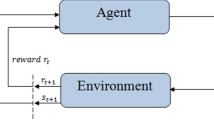Abstract
In this paper, we develop the control rules for job shop scheduling based on theFlow Rate Control model. We derive optimal control results for job shops with work station in series (transfer line). We use these results to derive rules which are suboptimal, robust against random events, and easy to implement and expand.
Similar content being viewed by others
References
J.H. Blackstone Jr, D.T. Phillips and G.L. Hogg, A state-of-the art survey of dispatching rules for manufacturing job shop operations, Int. J. Prod. Res. 20, No. 1 (1982) 27–345.
R.W. Conway, W.L. Maxwell and L.W. Miller,Theory of Scheduling (Addison-Wesley, Reading, Mass., 1967).
M. Fox, Constraint-directed search: a case study of job-shop scheduling, Ph. D. Thesis, Carnegie-Mellon University, 1983.
S.C. Graves, A tractical planning model for a job shop, Working Paper, Alfred P. Sloan School of Management, MIT, 1985.
E.W. Lawler, Recent results in the theory of machine scheduling.
J. Kimemia and S.B. Gershwin, An algorithm for the computer control of a flexible manufacturing system, IIE Transactions, 15, No. 4 (December 1983) 353–362.
J.K. Lenstra, Sequencing by enumerative methods, Mathematical centre Tract 69, Mathematisch Centrum, Amsterdam, 1977.
S.X.C. Lou, G. Van Ryzin and S.B. Gershwin, Scheduling job shops with delays,Proc. IEEE International Conf. on Robotics and Automation, Raleigh, North Carolina, March, 1987.
S.X.C. Lou, Job shop scheduling using flow rate control, M.I.T. Laboratory for Information and Decision Systems, LIPS-P-1618, September, 1986.
S.B. Gershwin, R. Akella and Y.F. Choong, Short-term production scheduling of an automated manufacturing facility, IBM Journal of Research and Development, Vol. 29, No. 4 (July 1985) 392–400.
R. Akella, Y.F. Choong and S.B. Gershwin, Performance of Hierarchical production scheduling policy, IEEE Transactions on Components, Hybrids, and Manufacturing Technology, Vol. CHMT-7, No. 3 (September 1984).
R. Akella and P.R. Kumar, Optimal control of production rate in failure prone manufacturing system, IEEE Trans. on Automatic Control, Vol. AC-31, No. 2 (February 1986) 116–126.
T. Bielicki and P.R. Kumar, Optimality of zero-inventory policies for unreliable manufacturing systems (1987).
S.C. Graves, H.C. Meal, D. Stefek and A.H. Zeghmi, Scheduling of re-entrant flow shops, Journal of Operations Management, Vol. 3, No. 4 (August 1983) 197–207.
G. Van Ryzin, Control of manufacturing systems with delays, M.S. Thesis under preparation, Laboratory for Information and Decision Systems, MIT.
D.P. Bertsekas,Dynamic Programming: Deterministic and Stochastic Models (Prentice-Hall, Inc., 1987).
S.E. Dreyfus and A.M. Law,The Art and Theory of Dynamic Programming (Academic Press, New York, 1977).
R.A. Howard,Dynamic Programming and Markow Processes (MIT Press, Cambridge, Massachusetts, 1960).
Author information
Authors and Affiliations
Rights and permissions
About this article
Cite this article
Lou, S.X.C., Van Ryzin, G. Optimal control rules for scheduling job shops. Ann Oper Res 17, 233–248 (1989). https://doi.org/10.1007/BF02096607
Issue Date:
DOI: https://doi.org/10.1007/BF02096607




